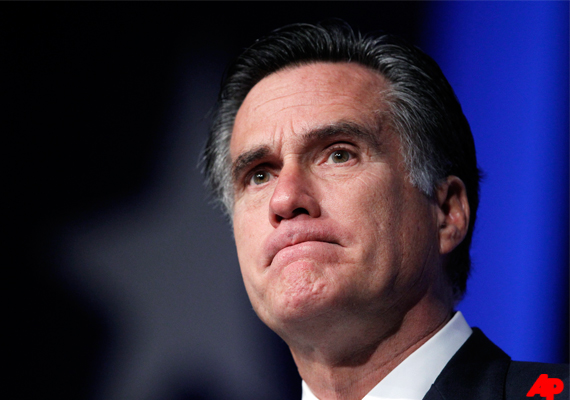
Washington, Oct 10: Republican presidential front-runner Mitt Romney has tightly tied his message to the economy, but his opponents are increasingly criticizing his past flip-flops on abortion, gay rights and other issues in an effort to derail the candidate who sits atop national opinion polls and a mound of campaign cash.
The criticism likely marks the start of a new phase in the Republican nomination fight at a time when Romney's main rival, Rick Perry, has lost some of his Texas swagger. The Texas governor shot to the top of Republican presidential polls shortly after he entered the race, only to plummet after a shaky debate performance.
Whatever the cause, it was a more careful Perry who campaigned in leadoff caucus state Iowa over the weekend, trying to get his campaign back on track before Tuesday's debate in New Hampshire and an Oct. 18 debate in Las Vegas.
Both Perry and U.S. Rep. Michele Bachmann of Minnesota have started to assail Romney for being wobbly on the issues.
“For some candidates, pro-life is an election-year slogan to follow the prevailing political winds,” Perry told social conservatives recently. And Bachmann said: “You won't find YouTube clips of me speaking in support of Roe versus Wade.” The 1973 U.S. Supreme Court decision in the Roe v. Wade case legalized abortion.
In this race, Romney has argued that his business background makes him the most qualified Republican to challenge President Barack Obama whose approval ratings have dropped as the economic recovery sputters and unemployment remains stuck above 9 percent.
So far, Romney has avoided the issues that tripped up his last presidential campaign in 2008. He ran to the right of the eventual nominee, Sen. John McCain, casting himself as a rock-ribbed conservative on cultural issues even though he had through the years reversed his positions on such topics, priorities for religious Republicans who make up an important part of the Republican base. His Mormon faith also dogged him with evangelicals, many of whom do not believe that Mormons are Christian.
Romney seems prepared to take more punches if it comes to that. He's already casting his shifts as the hallmark of a good businessman.
“In the private sector, if you don't change your view when the facts change, well you'll get fired for being stubborn and stupid,” Romney said last month in New Hampshire. A week earlier, he said Americans “can tell when people are being phony and are pandering to an audience, and you'll see that in politics. You're not going to see that in my campaign.”
His 2008 opponents, who didn't hide their disdain for Romney, largely kept their distance on the faith issue, but they didn't hold back on his position shifts and successfully tagged him as a flip-flopper. People wondered what, if anything, he stood for.
Romney gave his rivals much fodder then by casting himself as the conservative choice and staking out hardline positions on cultural issues. That didn't square with the moderate views he expressed in support of abortion and gay rights in an unsuccessful 1994 Senate race aganst Edward M. Kennedy and a victorious 2002 governor's race in liberal-leaning Massachusetts.
In his Massachusetts campaigns, Romney also emphasized his support of gun-control measures and didn't take a hardline position on illegal immigration—issues on which he equivocated in the 2008 campaign. Romney is also vulnerable because as Massachusetts governor he supported a mandate for health insurance coverage, which is a key component of Obama's health care reform that Republicans loathe.
But Perry's record as Texas governor has also left him vulnerable—particularly his support of a measure that gave lower in-state college tuition rates to illegal immigrants.
Perry has sharpened his answers about illegal immigrants, the topic that bedeviled him in the Sept. 22 candidates' debate.
Some Republicans at all four Iowa stops in two days said Perry seems too sympathetic to illegal immigrants. News of Texas' tuition policy “bothered me when it first came out,” said Jim Lichty, 58, a land surveyor.
Perry defended the tuition measure. But he avoided suggesting that its critics have no heart, as he did in the last debate, to widespread criticism. He stuck entirely to economic reasons.
“Are we going to create a class of tax wasters or are we going to create taxpayers?” he asked, describing the difference between immigrants who don't go to college and those who do. “Texas chose the latter.”
Perry addressed the tuition issue only when asked, but at every stop he eagerly detailed several of his get-tough positions on immigration. They included his vetoing a bill that would have let illegal immigrants obtain Texas driver's licenses, spending heavily on border security, and his endorsement of a law requiring photo identification cards for Texans seeking to vote.
In Iowa, the Texas governor stuck to his stump campaign speech, sometimes glancing at notes. He took a half dozen questions from voters at each stop, but none from the numerous reporters around him. AP

















